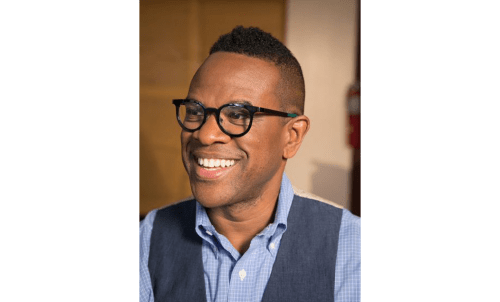Filmmaker Thomas Allen Harris Receives National Science Foundation Grant Alongside New York Hall of Science
Thomas Allen Harris, Professor in the Practice of Film & Media Studies and African American Studies, has been awarded $3.2 million from the National Science Foundation.

Thomas Allen Harris, Professor in the Practice of Film & Media Studies and African American Studies in the Faculty of Arts and Sciences, has been awarded a $3.2 million grant from the National Science Foundation.
The grant, awarded jointly to Harris’s Family Pictures Institute for Inclusive Storytelling and the New York Hall of Science, will support the filming of a new documentary and an experiential community engagement project that will connect audiences with science centers around the country.
Both projects will engage communities traditionally underrepresented in the fields of science, technology, engineering, and math. The grant will also support research on culturally-responsive strategies to advance educational practices in informal STEM learning at science centers, museums, and beyond.
“This NSF grant is the largest grant the Family Pictures Institute has gotten for any single project, and it’s also going to support the national storytelling campaign we plan to do around African American participation in science and elevating those stories,” Harris said.
As part of the overarching project Scientists in the Family, Harris will write, direct, and produce a documentary, “My Mom, the Scientist,” about both the joys and challenges encountered by Black people in STEM fields.
Harris hopes the documentary, which will be broadcast on PBS, will introduce audiences to pioneering scientists they haven’t heard of—including his mother Rudean Leinaeng, a chemist, professor, and activist.
“It’s really exciting to get this support on a project that helps me bridge my scientific training with my decades of community storytelling,” Harris said. “I think it’s really critical to increase access to STEM in this particular moment.”
The documentary is just one part of the Scientists in the Family Project, which will also establish a community-photo sharing project to engage audiences at science centers nationwide including in Philadelphia, San Diego, Charlotte, Detroit, and four more cities beginning in 2025.
“We are thrilled that the NSF has supported this collaboration with the NYSCI,” Harris said. “Together, we hope to show Underrepresented communities that there is a place for them in STEM and that science has always been an integral part of their lives. We are grateful for the support of my colleagues here at Yale and hope to work with and augment existing programs with similar missions at the University.”